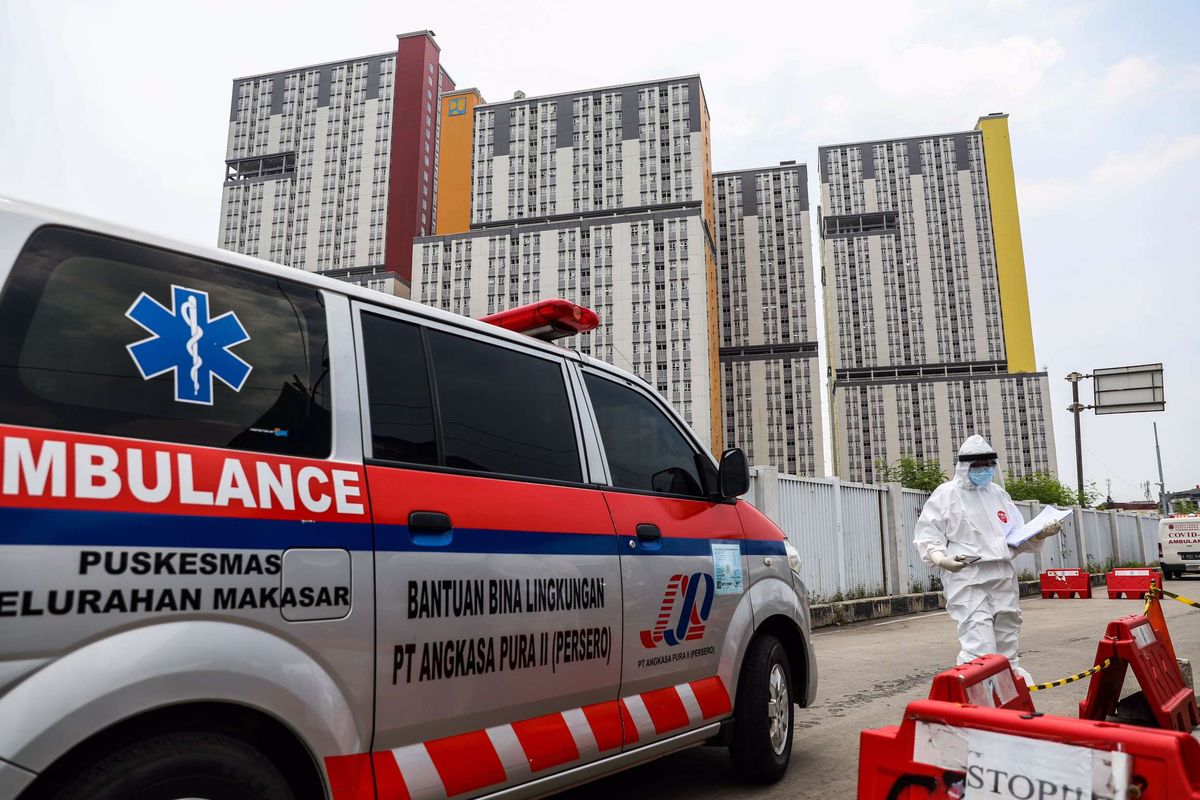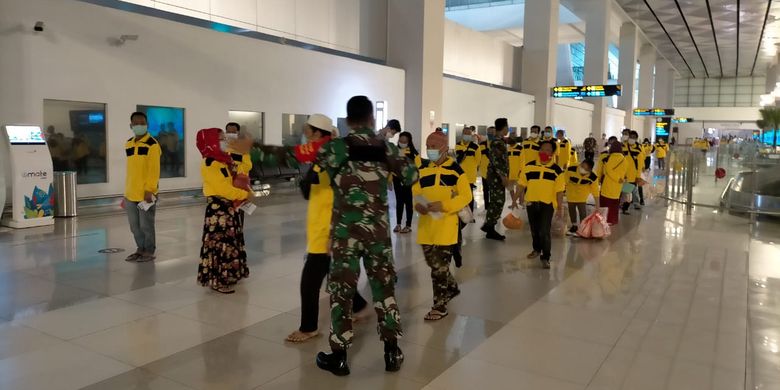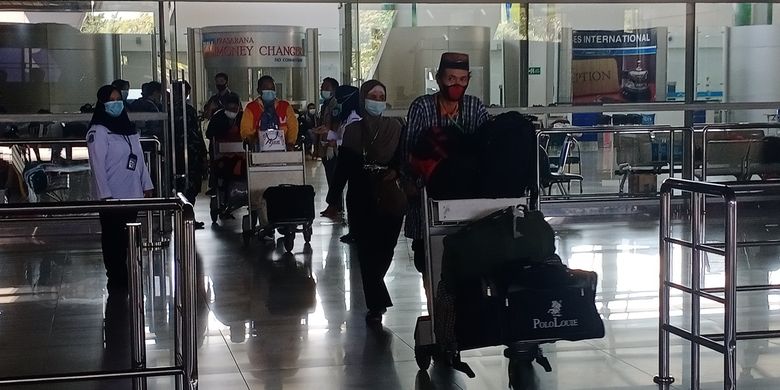Indonesia Highlights: Community Activity Restriction Policy to Curb Covid-19 Is Ineffective in Jakarta: Medical Association | Malaysia Deports 131 Problematic Indonesian Migrant Workers | Indonesia, N

KOMPAS.com – Indonesian Medical Association (IDI) Jakarta chapter said the implementation of restrictions on micro-scale public activities in the capital did not work out as the spread of coronavirus kept increasing.
A total of 131 problematic Indonesian migrant workers have been deported from Malaysia on Sunday, June 27.
Below are excerpts from the news in Indonesia, curated by Kompas.com editors:
Community Activity Restriction Policy to Curb Covid-19 Is Ineffective in Jakarta: Medical Association
Indonesian Medical Association (IDI) Jakarta chapter head Slamet Budiarto said that the implementation of restrictions on micro-scale public activities or PPKM Mikro did not significantly curb the spread of Covid-19 in the capital.
“PPKM Mikro is ineffective, hospitals in Greater Jakarta are currently overloaded,” Slamet said on Sunday, June 27.
Slamet suggested that the previous partial lockdown or large-scale social restrictions (PSBB) should be implemented again in Greater Jakarta.
“At least the PSBB (partial lockdown) should be strictly implemented as it was previously done at the beginning of the pandemic. However, the policy should be imposed in Greater Jakarta,” Slamet said.
There is a need to cut working hours in the capital because the spread of Covid-19 often occurs during the day.
Slamet hoped that a similar mistake should be prevented from reoccurring, including limiting the number of people entering Indonesia.
As of Sunday, June 27, the new Covid-19 cases in Jakarta reached more than 9,000, the highest daily number of coronavirus cases since the pandemic hit the capital in March 2020.
Malaysia Deports 131 Problematic Indonesian Migrant Workers
 A total of 131 problematic Indonesian migrant workers have been deported from Malaysia on Sunday, June 27.
A total of 131 problematic Indonesian migrant workers have been deported from Malaysia on Sunday, June 27. A total of 131 problematic Indonesian migrant workers have been deported from Malaysia on Sunday, June 27.
“The deportation of the second batch vulnerable group comprising 131 problematic Indonesian migrant workers have arrived in Soekarno-Hatta International Airport at 2 pm local time by national flag carrier Garuda Indonesia,” an official at the Manpower Ministry Suhartono told Kompas.com.
The migrant workers comprised 61 men and 67 women, including an expectant mother and two sick persons. But, they were given fit-to-fly certificates for travel. The group also comprised three toddlers.
The Ministry of Foreign Affairs said initially the deportation of the second batch comprised 148 people. But, 17 people were not allowed to travel due to health problems.
The repatriation cost was borne by Indonesia’s Ministry of Foreign Affairs, using the budget for protecting the Indonesian citizens. Meanwhile, the repatriation to the areas of origin will be handled by the Agency for the Protection of Indonesian Migrant Workers (BP2MI) and the Ministry of Social Affairs.
Suhartono said upon arrival at the airport, the migrant workers will strictly follow the health protocols, including undergoing quarantine for five days at the Wisma Atlet Kemayoran emergency hospital for Covid-19 patients in Central Jakarta.
Indonesia, Netherlands Discuss Recruitment of Nurses, Caregivers
 An illustration of Indonesian migrant workers arriving at the Juanda International Airport in East Java.
An illustration of Indonesian migrant workers arriving at the Juanda International Airport in East Java. Indonesia and the Netherlands have agreed to negotiate on the extension of social protection cooperation which had ended recently.
The plan was conveyed by the Dutch delegation during a meeting with the secretary-general of Indonesia's Manpower Ministry Anwar Sanusi on the sidelines of the G20 meeting, where the officials of both countries discussed issues on manpower.
"We welcome the plan to evaluate and extend the MoU [memorandum of understanding] on social protection. We believe that this cooperation can improve social protection for workers," said Hindun Anisah, a special staff of the Manpower Minister on Friday, June 25.
Hindun went on to say that the officials of both nations also discussed the recruitment and placement of the Indonesian migrant workers, known by its Indonesian acronym PMI, in the caregiving services.
The Netherlands has many job opportunities for nurses and caregivers due to the increasing number of its elderly population. "This is certainly a good opportunity for the placement of specified skilled workers from Indonesia in the health sector [caregiving services]," said Hindun.
Meanwhile, Reza Hafiz Akbar, a special staff for the Manpower Minister, said during the meeting, the Dutch officials also committed to supporting the creation of sustainable jobs and the inclusive labor market as well as the development of human capacity for sustainable productivity growth.
The creation of sustainable jobs aims to support workers with disabilities to enter the labor market through the provision of job training programs and the provision of social protection.
Meanwhile, the job training programs are not only the responsibility of the government, but they also involve all parties, including employers and labor unions, according to the Dutch officials.
The officials also touched on community-based vocational training which is one of Indonesia's priority issues. As of now, the Manpower Ministry has established 2,127 Community Work Training Centers to improve the skills of Indonesian human resources.
"The Dutch government will support this program so it can be a solution in developing social community-based competencies, and the Indonesian government also welcomes the potential for cooperation of the two countries in supporting priority issues," said Reza.
Simak breaking news dan berita pilihan kami langsung di ponselmu. Pilih saluran andalanmu akses berita Kompas.com WhatsApp Channel : https://www.whatsapp.com/channel/0029VaFPbedBPzjZrk13HO3D. Pastikan kamu sudah install aplikasi WhatsApp ya.
































